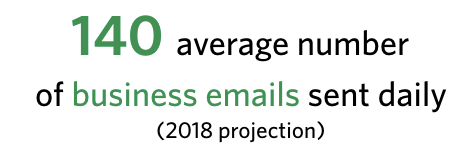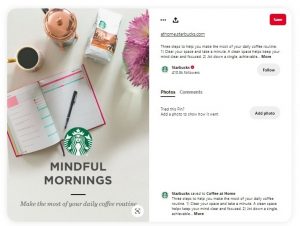By 2017, 132 billion business emails will be sent everyday. With roughly 1 billion email accounts, that is an average of 130 emails sent and received—and that is just the business emails. Consumer and personal email statistics are much, much higher.

[Source: radicati.com]
Add to that, the fact that most emails are now opened on mobile devices—anywhere between 45 and 75%, depending on the statistic you look at.
Impressive statistics. But what does it all mean for your average B2B marketer? if you are trying to get the attention of prospective clients in an email, you better be sure your email language is right on target.
But first that email needs to be opened—not cast immediately into the trash.
Today, you’re going to learn how to write a subject line that piques a reader’s interest and makes them far more likely to open and read your email.
Step 1. Capture Your Email’s Key Message
The purpose of your subject line is simple. It communicates what’s in the body of your email. So begin by reading your email from start to finish. See if you can boil it down to a single key point. That’s your subject line.
Of course, writing a great subject line is never that straightforward. It can get complicated if there are multiple components to your message. If that is the case, the trick is to figure out which points need to be referenced in your subject line and which can be left out.
Suppose you want to promote an upcoming webinar. Your email language will have to consider at least three important pieces of information:
- That you are having a webinar
- The topic (or title) of the webinar
- The date of the webinar.
At the very least, you’ll have to include 1 and 2 in your subject line, but omit 3. On the other hand, if you want to convey urgency—or you are sending out a reminder about tomorrow’s webinar—you may want to include all three. Here are three strong subject lines to promote a webinar.
Examples:
Webinar: 6 Ways to Control Construction Costs
Aug. Webinar: How to Control Construction Costs
Reminder: Construction Costs Webinar is Tomorrow
Step 2. Keep it Short
According to research conducted by email service provider MailChimp, subject lines of 50 or fewer characters tend to perform better than longer subject lines. This makes sense because many email browsers truncate long subject lines—usually somewhere around 50 characters.
Working within this limit may feel frustrating at first, but it comes with a hidden benefit. It forces you to distill your message to its essence. And that makes your message more powerful.
Consider the following subject line:
Download our 2015–2015 research study on federal IT security threats, issues, and priorities
At 92 characters, it’s a bit overgrown. Let’s see what happens if we do some clipping.
Download our latest federal IT security study
That’s a lot shorter! 45 characters. It easily falls under our 50-character threshold and we didn’t sacrifice anything important.
- We replaced “2015-2016” with the word “latest.” That seems to work.
We pruned “threats, issues, and priorities,” but they were dead wood anyway. The word “security” sums those up nicely.
And the phrase “research study” seems downright redundant.
While we’re in slasher mode, could we possibly trim this any further? Let’s find out.
New study on federal IT security
This subject line is a skeleton of its former self, but it seems to convey everything you need. The only question is whether the verb “download” would improve open rates.
Fortunately, a simple experiment will answer this email language question. It is called a split test. Send an email using the slightly longer subject line to half your list, then send it again with the shorter subject line to the other half. You’ll soon have your answer!
SEE ALSO: Critical Email Marketing Do’s and Don’ts for Professional Services
Step 3. Remove Sales Language
Buyers of professional services are deeply suspicious of hype. But they will respond to a subject line that provides a clear offer—as long as it’s relevant and useful. Let’s look at a couple of examples.
Here’s a subject line that’s not likely to get many opens:
“Hurry! This Accounting Services Special Offer Ends Soon!”
What’s wrong here? Well, it’s a little vague and punctuated with exclamation points. The real problem is that it uses consumer sales language to sell a complex and expensive service. Even the most impulsive professional services buyer is going to think twice about this one.
In fact, the problem with this email only begins with the subject line. The entire strategy is flawed. While a better subject line might produce more opens, few, if any, readers are going to take the next step.
What would be a better approach? Get rid of the hyperbolic language and make sure the topic is relevant for the intended audience. Here’s an example of a stronger subject line that promotes similar services:
“Try the Accounting Firm That Is Built for Small Businesses”
Assuming it was sent to a list of small businesses, this subject line has a much better chance of success. For one thing, it is clear who it’s for (small businesses)— answering the question, “Is this relevant to me?” And while it’s written as a call to action (in essence, “Try us”), the message is delivered without hoopla. Because this accounting firm is “built for small businesses” it has a powerful focus that makes it appealing to its target audience.
Step 4. Be Clear, Not Clever
Research by Marketing Experiments and others has shown that clever subject lines almost always underperform clear, straightforward language. One study, showed that clear subject lines resulted in a 540% increase in open rates over their clever alternatives.
So when you want people want to take a specific action (such as read your email), you are better off stating your point without irony, humor or creativity. There’s a place for clever language in your marketing. But your subject line isn’t it.
Step 5. Avoid Stop Words
Below is a list of words that have been associated with lower open rates or triggering spam filters:
Percent off
Reminder
Help
Buy
Clearance
Earn $
Make $
Earn
From home
Biz
Cash
Claim
Collect
Income
Get out of
Increase your
Prescriptions
Free
Millions
Urgent
Dear
Unless you have a good reason to use any of these, we suggest leaving them out of your subject line There is one possible exception, however. The word “free.”
“Free” has a well documented power to persuade. You may want to experiment with a split list test and see how it performs. Many of our clients have had good results with “free” and the benefits outweighed the potential negatives.
Digital & Social Articles on Business 2 Community(67)
Report Post






